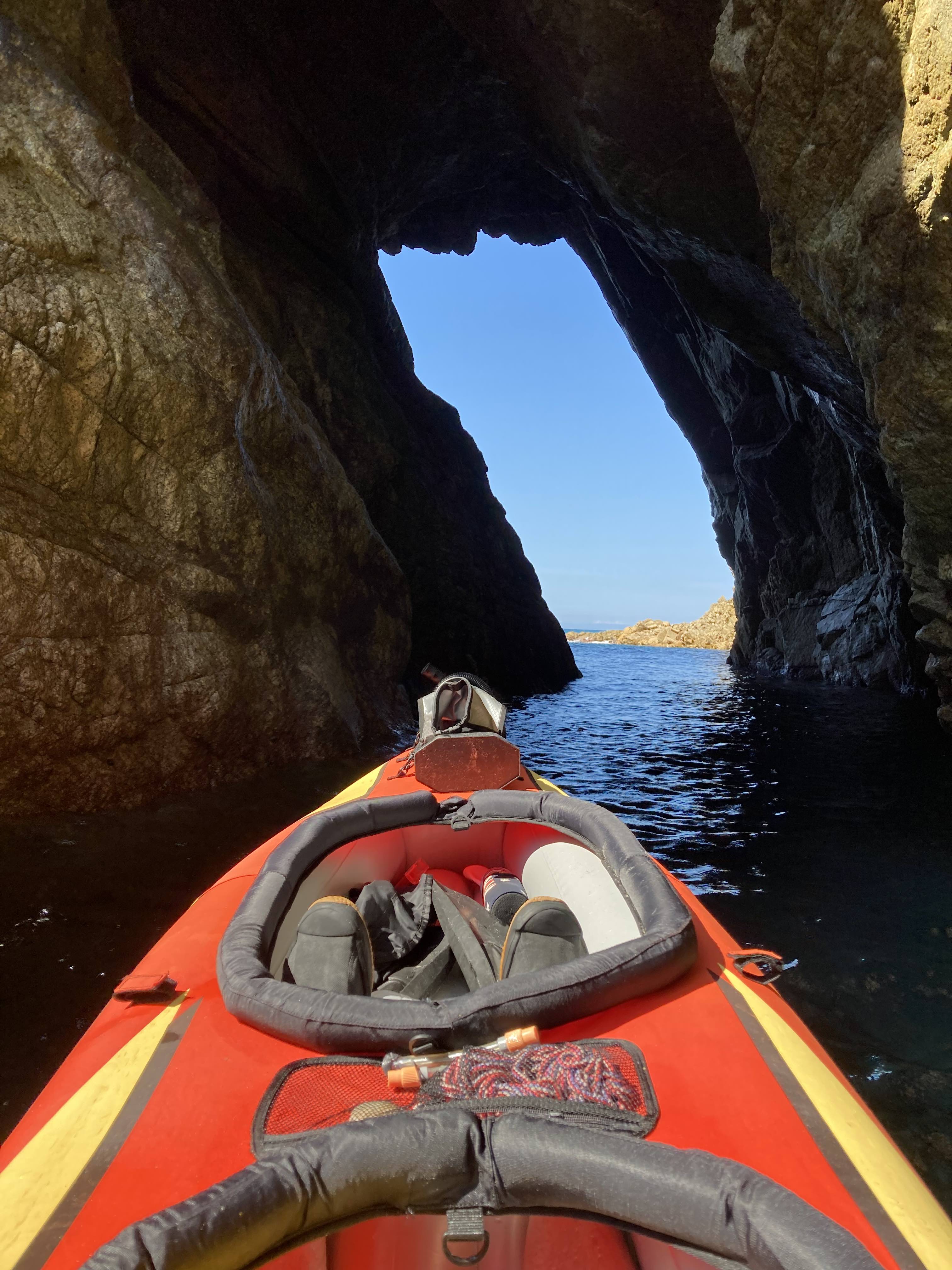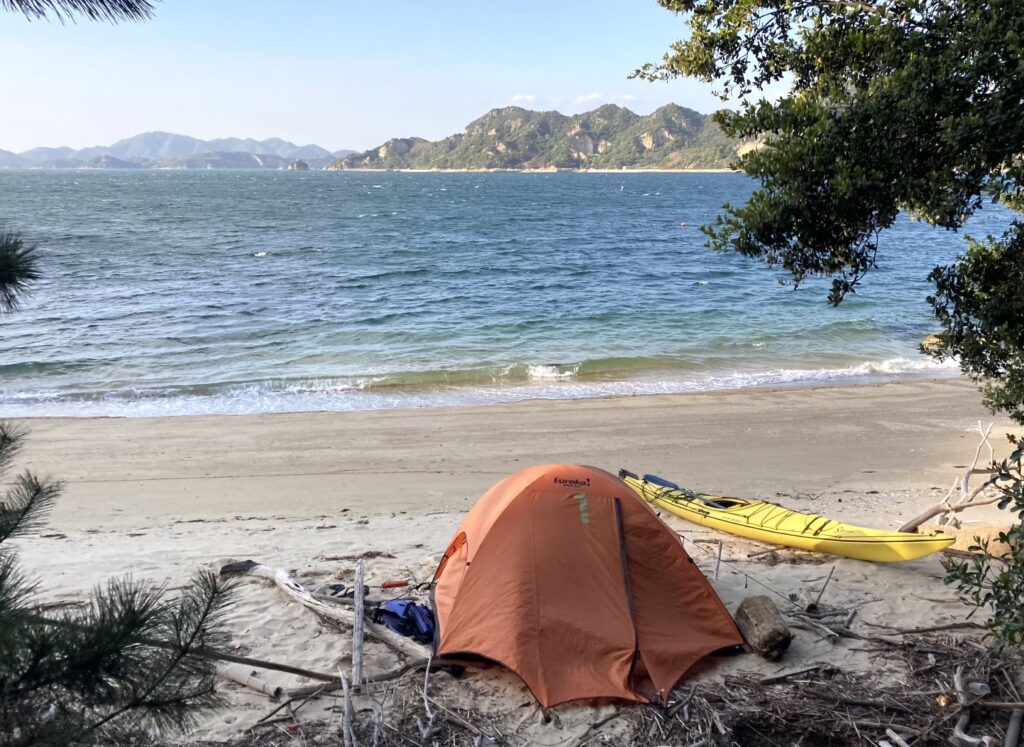A smooth sea never made a skilled sailor.
― FDR
Sea kayaking isn’t an activity you hear much about, yet Japan’s coastline is made for travel-by-paddle.
I have lived in Hyogo for 26 years and bought my first sea kayak in 2001 — a folding Folbot Greenland II — and later added an inflatable Advanced Elements Dragonfly 2, both of which I can transport inside a car, on ferries, or even by train with ease.
For almost 16 years, a tight-knit, albeit motley, crew of two New Zealanders, two Americans and one Australian have comprised the ‘Salty Dogs’. Together we’ve explored the coves, uninhabited islands, sea caves, and secluded bays of Hyogo, Kagawa, Okayama, Hiroshima, and Tottori prefectures, alternating our trips between the Japan Sea and the Seto Inland Sea as the seasonal weather dictates.
A side hobby has been to record each of these trips in a journal. I call it The Dogs’ Logs, a document that has grown beyond 60,000 words and which I’ve shared with each member for their own nostalgic reading pleasure.
The following are edited snippets.
Ode to The Cove
Now and again, from the end of late June
I call up the boys and whistle a tune.
They know the sound, no words to be said,
We pack up our kayaks, beer and some bread.
And set sail north,
To where a Tottori wind blows.
And paddle our boats to a beach that we know.
Perfect Cove!
Where the water is clear and the sand clean’n pure
The city’s what ails us but this place is the cure!
The Squall
A box-shaped cove with golden sand and tea-green water with rocks for leaping off is our home for two nights.
Around late afternoon the light wanes and the sea breeze strengthens. Purple monsters creep from the horizon. Strung beneath them are long veils of rain, harmless looking from a distance, like lace curtains, but approaching quickly.
‘That’s a squall coming,’ I say.
Thirty seconds is time enough for all of us to dive into our tents before a freight train of salt, sand, and cold hard rain slams into the cove. My tent pegs give way; only my body weight holds all worldly possessions earthbound.
I hear shouting; plates, tarps, bottles, cans, goggles fly this way and that, clattering against the rocks. J. shields the fire with his body, protecting a precious ember as rain pelts him horizontally. The squall has sucked all the light from the day and I struggle in the dimness to keep my tent from being blown away; it’s now upside-down. Someone’s hands help me bury it beneath sand.
We rendezvous around the sputtering fire, all members accounted for, a big blue tarp wrapped around all five of us, the fury of the rain still at our backs. From the sand I salvage a new bottle of awamori. We pass it gratefully, coughing on woodsmoke, until the yarns begin and we forget the squall and begin to enjoy ourselves.
Later, the camp hunkers down for a rainy night. Headlamps turn each tent into a glowing cocoon. Each nestled inside a sand berm, stretched skin-tight against the sea wind. Each one of us is now lost in his own thoughts, or book, or stash of alcohol known only to him and Buddha. But my attention is on the raindrops splattering onto my cheek. I plug the tear-hole in my tent with a shopping bag and lie back exhausted.

The Bat Cave
Somewhere between Igumi and Moroyose, a mousehole opening in the rocky bluff appears. Its entrance is swarming with sea roaches—millions of them. Big, dopey-eyed, unlovable critters with articulated body armour and long spindly legs. They scatter across the grotto walls at our approach. Must be mindful of the razor-sharp mollusks and barnacles which bristle at the water line. One mislaid paddle stroke, rogue wave, or lapse in attention, and my Dragonfly 2 will be turned into a noodle sieve.
Twenty metres inside, daylight fades. We turn on headlamps. The squeak and twitter of bats tells us we aren’t alone.
Calcite formations glisten, strange milky coloured ripples like the wet rib bones of some ancient monster, fossilised. Our headlamp beams travel the ever-tapering walls to a small beach in the distance.
The wavelets on its tiny shore glow with phosphorescent plankton. We beach our boats and fossick the sea junk for curios. But the flotsam-jetsam has been put through the mill, ground smooth—polished pieces of sake bottles, fishing buoys, and frayed anchor ropes—by years of wave motion inside the cave.
I glance over my shoulder. “Where’s your boat?”
“What?”
J’s boat has disappeared into the darkness. He quickly wades into the black water, is soon up to his chest, with his headlamp raking the cave walls. We are at least 100 metres inside the cavern. A gentle surge has lifted his boat from the sand, and the outwash coaxed it away.
A rustling noise sounds above us.
Our voices have stirred the little creatures. They drop from their roosts in their dozens, screeching, urine-stinking, darting this way and that, raking the water with their wings.
J.’s headlamp beam locates his boat beneath an overhang. He swims to it and is quickly inside and paddling. My head burrowed into my knees, my straw hat pulled down tightly, and with thrusting paddle strokes, we make our escape.
Two fishermen have anchored their skiff at the cave’s mouth. They are startled to see two squinty-eyed white men in kayaks emerge from the hole in the earth with a swarm of irritated bats in pursuit.
A Kajiko-jima Camp
A living room fashioned from sea junk: a wooden cable reel for a dining table, driftwood stumps and polystyrene buoys for chairs, an old refrigerator door makes the perfect kitchen work bench. All of this under a shelter fashioned out of bamboo poles, fishing twine, and a homecentre tarp. Beneath its gently flapping eaves, there’s a smouldering campfire in front and a midden of empty wine bottles behind. A loungeroom Robinson-Crusoe would have been proud of.
Shorebreak dining
In Perfect Cove (Tottori prefecture): warblers wake me around 6 am. Breakfast is melted cheese and ham on toast grilled over last night’s smoking embers. This is followed by a can of apricots, and with the empty can to boil water, a freshly brewed coffee!
A Kajiko-jima breakfast (Okayama prefecture): gritty wok-fried bacon, ruptured eggs and blackened tomatoes with smoky-flavoured toast cooked over a pine-wood fire, all washed down with three cups of smoky-flavoured coffee.
On Shodoshima (Kagawa prefecture): sea kites wheel overhead and woodsmoke drifts out across the water, as a luxuriant feast of smoked salmon, water crackers, blue cheese, olives, and prosciutto materialises from our cooler boxes. It is the sunset hour.
Near Hamasaka (Hyogo prefecture): under torchlight, and on a makeshift work-bench of water containers and driftwood planks, I skewer onto bamboo stakes pieces of beef, eggplant, bell pepper, mushrooms, and onion, season with salt and spicy raiyu oil, then lay them over glowing coals. My face is streaming with sweat — a cold beer for Cookie, will you!
Sunset Beach
The man with mousy brown hair and a faded tall-ship tattoo on his right forearm sits down on the sea wall. He bends to tie up his shoelaces. ‘You fellas camping where?’ he asks without looking up. He ties the laces with precision, each bow the exact same length as the other, each aligned perfectly with its aglets.
‘Kitagi island,’ I reply. ‘Sunset Beach.’
‘Never heard of it.’
‘That’s because we named it ourselves.’
‘Kitagi?’
‘Long stretch of golden sand with a southwest aspect.’
‘Aspect?’ His eyebrows rise. ‘You fellas in the real estate business now?’
‘Banana-shaped beach, lots of sea junk …’
‘Know it,’ he grins. ‘Good choice. Sheltered. No access road. And no rain for the next few days.’
He lifts his tall frame off the wall and returns to a makeshift bar he has constructed in the front yard. It faces the straits of the Seto Inland Sea. On the counter lies a toilet fan he has been repairing. Behind him stands a turn-of-the-century home with a newly tiled roof and an earthen genkan floor — the quintessential island homestead.
‘Well, just so you know,’ he says, ‘If you get into trouble, miss the last ferry, run out of money, beer, whatever, you can sleep here anytime. Got plennie of futons.’
Departure
Leaving Kajiko-jima, like autumn itself, is a melancholy affair. The sun shines but the air is cold. Our bellies full of hot stew, bread, and beer, we kick out the fire, jump into our boats and begin the long paddle back to Honshu. The sea is as smooth as glass; I want to put my feet up and trail hands in the frigid water. But we are racing against the November sun.
*************************
Simon Rowe grew up in small town New Zealand and big city Australia when orange Fanta came in glass bottles and AM radio was king. Based in Himeji city, Hyogo, he has been penning travel stories, screenplays, blog posts, short and long fiction for well over two decades. His writing has appeared in TIME (Asia), the New York Times, The Paris Review, CNN Traveller, South China Morning Post, and The Australian. His short fiction includes Good Night Papa: Short Stories from Japan and Elsewhere, as well as the 2021 Best Indie Book Award winner, Pearl City: Stories from Japan and Elsewhere. His newest work, Mami Suzuki: Private Eye (Penguin, 2023), follows the adventures of a Kobe single mother private detective across western Japan.

